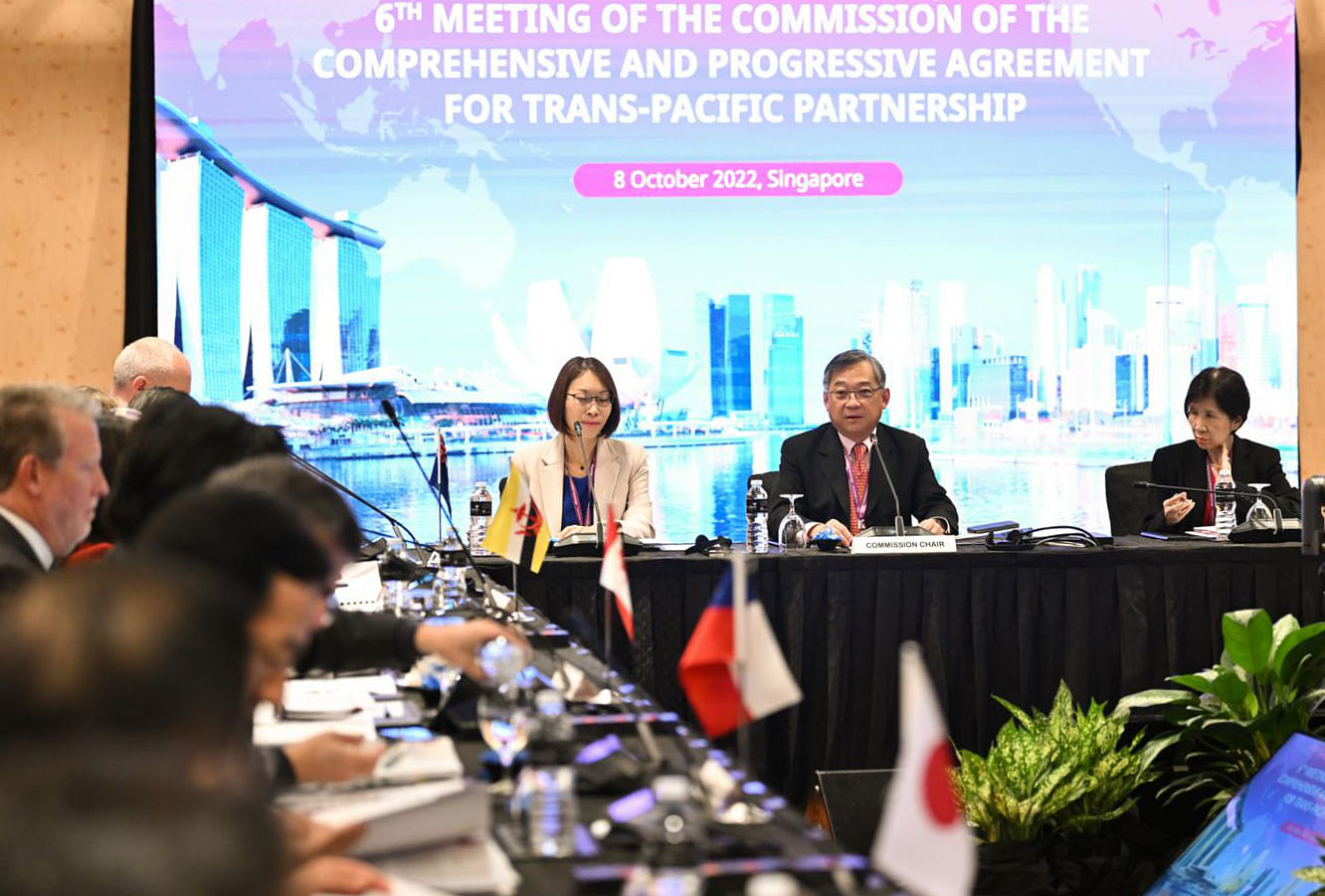UK accession process to be benchmark for other CPTPP trade pact applicants: Gan Kim Yong
Sign up now: Get ST's newsletters delivered to your inbox

Trade and Industry Minister Gan Kim Yong said CPTPP members support the pact's expansion by countries committed to its objectives.
ST PHOTO: LIM YAOHUI
Follow topic:
SINGAPORE - The process of Britain'ss accession to the Comprehensive and Progressive Agreement for Trans-Pacific Partnership (CPTPP) will become a benchmark for assessing other applications to join the trade bloc.
In a joint press conference after a CPTPP meeting on Saturday chaired by Singapore, trade ministers from the 11 member countries said discussions on the Britain's accession were still ongoing and other applications are also under consideration.
Mr Gan Kim Yong, Singapore's Minister for Trade and Industry, said member states support the expansion of CPTPP with countries that are committed to the agreement's objectives.
"As this is the first accession by an aspirant economy, it is important that we do it well and put in place the right processes, so as to uphold the CPTPP's high standard rules and ambitious market access commitments," he said.
Japan's Minister of State for Economic and Fiscal Policy Daishiro Yamagiwa, who heads the CPTPP's Accession Working Group, said there is no deadline for approving the Britain's application and that the working group is still in negotiation with Britain.
The ministers congratulated Malaysia on becoming the ninth member state to ratify the pact.
The CPTPP will enter into force for Malaysia on Nov 29, 2022.
Only Brunei and Chile have yet to ratify the treaty.
CPTPP is a free trade agreement signed in March 2018 by 11 Asia-Pacific countries representing about 13 per cent of global gross domestic product.
Apart from Singapore, Japan, Malaysia, Brunei and Chile, the other members are Australia, Canada, Mexico, Peru, New Zealand and Vietnam.
The pact lowers barriers to trade in goods and services between member countries, which have also pledged to eliminate almost all tariffs and import charges on each other's products.
What makes CPTPP different from other free trade agreements is its provisions on common obligations on food regulations, environmental protections, the digital economy, investment, labour, and financial services.
Apart from Britain, China, Taiwan, Ecuador and Costa Rica have also officially applied to join the CPTPP. South Korea and Thailand have also shown interest in joining the pact.
Mr Gan said the four-year-old agreement has already started to deliver trade benefits to member states.
He referred to a study that found trade in goods among CPTPP members increased by about 15 per cent, from US$467 billion (S$700 billion) in 2019 to US$535 billion in 2021.
He said a similar upward trend for trade in services has been observed as well, driven by the growth in digital services, especially for telecommunications and information services.
He added that in the sustainability area, the members have started to discuss the development and trade of carbon credits. On the commitment to digitalisation, he said discussions have been initiated on electronic documentation of cross-border trade between member states.
A joint ministerial statement said earlier this year that the CPTPP had convened its first meeting of the E-Commerce Committee.
Building on discussions at the meeting, Singapore, in consultation with CPTPP members, has commissioned a study to examine the domestic laws and regulations that can be adopted by members to implement the obligations in the CPTPP e-commerce chapter of the agreement.
"Following the study, we may consider how our existing laws and regulations could be further reviewed to facilitate digital trade," the joint statement said.
In addition, the CPTPP's committee on competitiveness and business facilitation has embarked on an empirical analysis of the effects of the CPTPP on supply chains.
"We will also continue to build expertise in risk management mechanisms to mitigate supply chain vulnerabilities and promote the integration of small and medium-sized enterprises in global supply chains," said the statement.
The meeting in Singapore also adopted a set of non-binding guidelines for mutual recognition agreements (MRAs) or arrangements for professional services.
These guidelines are expected to increase transparency and consistency of MRAs negotiated by CPTPP members and contribute to a more business-friendly environment for trade in professional services.
New Zealand will host the next meeting of the CPTPP Commission in 2023.

